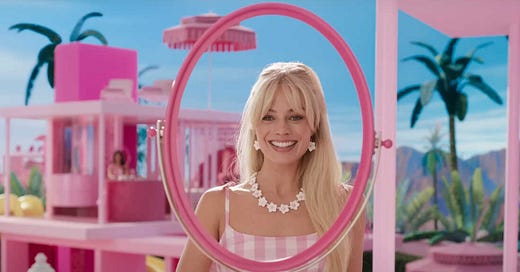"Barbie" is one giant wink
If we're all stuck in the hamster wheel of capitalism, we might as well dress it up in pink and have a good time.
I’d say this is a pretty spoiler-free situation — safe to read if you haven’t seen the movie. At least I think it is.
When I go for a walk through my Brooklyn neighborhood each day, I call my mom. She’ll answer, usually at home in Maine, and say, “Are you taking me for a walk?” I say yes, and she says, “Hold on, let me put on my shoes and I’ll join you.” Sometimes she tries to connect her AirPods to her phone while we’re talking, which inevitably means that she will hang up on me. She’ll then call me back a few moments later, both of us laughing, before we set off, together and apart.
Yesterday, I told her how much I loved Barbie; I’d seen the movie the night before. She was slightly incredulous. She doesn’t really feel one way or another about Barbies. As my mother, she didn’t take a firm stance (although she did say “I always thought Ken was a dork”). She didn’t buy them for me, but I didn’t ask. Someone once gave me a Barbie as a present, and I had absolutely no idea how to process it, so I hid the toy in the back of my closet.
Barbie mystified me as a kid because she was sexy. She had boobs. She was a woman. I was not, but I someday would be, and that was terrifying, so Barbie was therefore somewhat terrifying, too. I’m talking, like, “Holy shit, I do not understand this, but I’m worried that someday I will have to.” Barbie represented an adulthood I didn’t recognize. She didn’t look like my mother. I didn’t want that in my toy chest.
Instead, I played with American Girl Dolls. I loved those dolls. They were girls my age, and they were strong enough to hold up their own heads. Their torsos were wide enough to contain livers; Barbie’s could not. The American Girl Dolls came with backstories and were marketed as Strong Women of History. I never wanted the books of pre-written stories the dolls came with, so I felt validated when I grew up and realized most of their tales were problematic anyway. I spent hours making up fresh histories for my dolls, and they were alive because I infused myself into them.
Barbie was glaringly not alive. Her dead eyes rebuffed any imagination I tried to extend to her. I didn’t want to play with the lone Barbie at the back of my closet, and yet, I was intrigued. Dipping into the Barbie bucket at friends’ houses felt different, less permanent.
“Can we play Barbie?” I’d ask my friend who had tens of Barbies, several Kens (who were irrelevant to us), and even a Barbie Dream House and a convertible.
Keep reading with a 7-day free trial
Subscribe to The Wilder Things to keep reading this post and get 7 days of free access to the full post archives.




